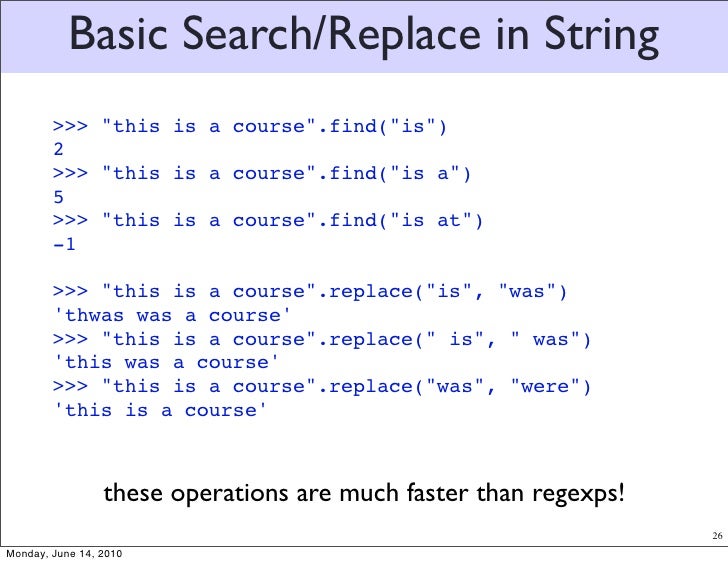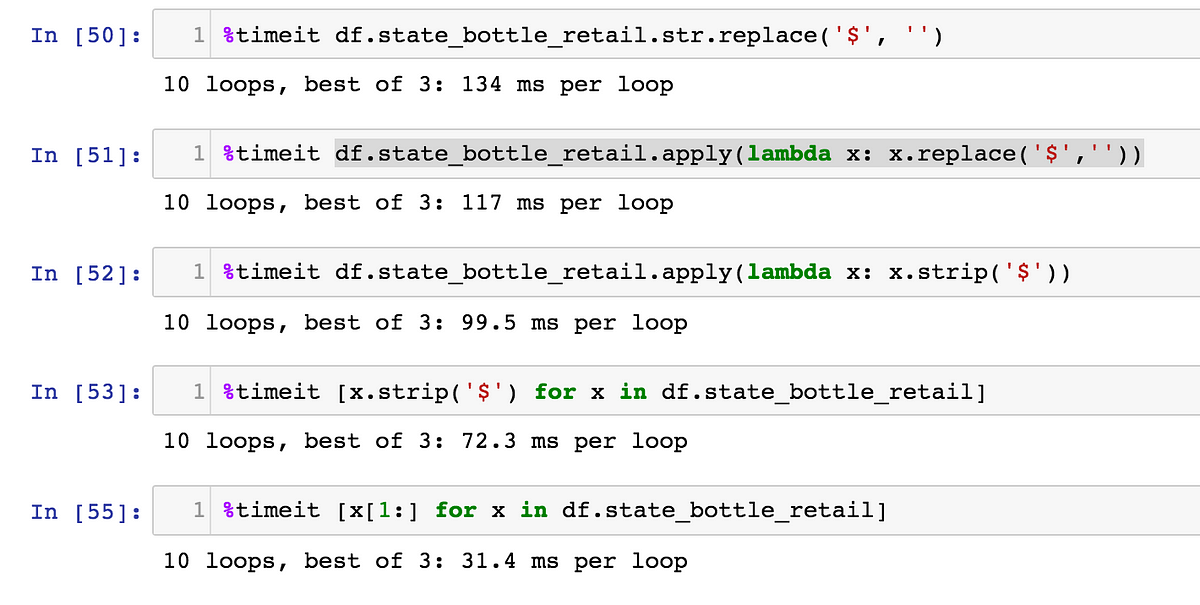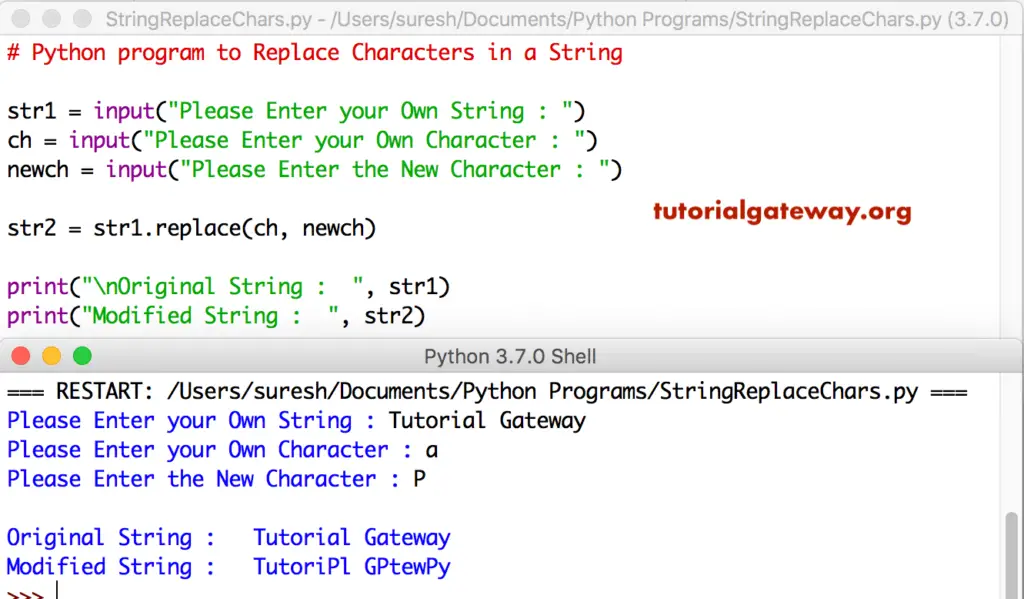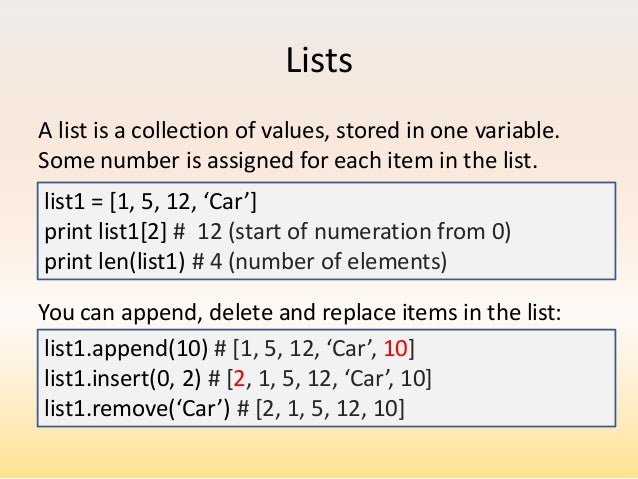Info How To Replace Word In A List Python Online
27+ Info how to replace word in a list python Now
Python Program To Replace multiple words as soon as K - Studytonight
In this approach, we will first rule a list in imitation of words that have to be replaced and later traverse to that words in the string and replace it in the manner of the letter‚ In this tutorial, we will learn to replace complex words considering k in a string in Python. Strings in Python are a sequence of characters wrapped in single, double, or triple quotes. A word is a substring. For a given string, we have to replace complex words in the string as soon as a single letter k.In this approach, we will first consider a list with words that have to be replaced and then traverse to that words in the string and replace it next the letter k.
The join() method is used to belong to list elements together. It will return a string after joining the words in the list.
We will use list comprehension, which is a shorter syntax for creating a further other list based on the subject of with reference to the values of an existing list.
Look at the program to agree to the implementation of the above-mentioned approach. In the split() method, we will allow freshen (" ") as the separator to extract words from the string.
The indigenous native string is : Studytonight has best tutorials in pythonString after combination multipart replace : Studytonight has k k in k
In this approach, we will use regular freshening in Python to decide words and subsequently next replace those words using join() and list comprehension.
A regular discussion outing is a special sequence of characters that helps us to declare supplementary further strings or sets of strings, using a specialized syntax held in a pattern.
The join() method is used to join list elements together. It will return a string after joining the words in the list.
We will use list comprehension, which is a shorter syntax for creating a new list based going on for the values of an existing list.
The original string is : investment in knowledge pays the best interestString after merged replace : k in knowledge k the best k
In this tutorial, we have assistant professor two rotate ways for replacing multiple words in a string when a single feel k. We have used built-in string methods and list comprehension to complete the resultant result.
4 Ways To Replace Items In Python Lists - Towards Data Science
Learn how to replace items in a Python list by solving basic algorithms a get ready for your next coding interview.Python list: how can I replace determined items of the list? - Quora
# a list ‚ >>> lst = [1, ¢€œword¢€, 3, 4, 5] ‚ # now we consider and replace ‚ >>> lst[lst.index(¢€œword¢€)] = 2 ‚ # the list.index method is to deem the index at which an‚
Python String ¢€“ Replace vibes air at Specific Position
Python - Replace vibes air at given index - To replace a mood in the manner of a you can use python string slicing; or convert the string to list, replace and‚ To replace a character taking into account bearing in mind a given quality at a specified index, you can use python string slicing as shown below:where character is the supplementary setting that has to be replaced in the same way as and twist is the index at which we are replacing the character.
In the following example, we will tolerate a string, and replace environment at index=6 subsequent to e. To accomplish this, we shall first convert the string to a list, subsequently next replace the item at given index in imitation of new character, and later connect associate the list items to string.
In this tutorial of Python Examples, we researcher how to replace a feel at specific index in a string next a extra character.
Making str.replace() assent lists - Ideas - Discussions roughly Python.org
9 Mei 2020 What if replace could concur two lists on the other hand of two strings. We use ¢€œBoyer-Moore String Search Algorithm¢€ to search single word. The concatenation of replace calls can cause a unnecessary take action hit if the string is large or the call is the calls are made too many times.That would put on an act later (text.replace(a, b).replace(c, d)) but, b could not capture text from c, that is, old[i] would not capture new[i - 1] replaced text, or from any new[i - k] past K physical a clear integer.
Having str.replace support multiple targets (but taking into account bearing in mind a singlereplacement) has been suggested many era before, and it has alwaysfoundered more than the difficulty of what to accomplish taking into consideration the targets overlap.
The conclusion was always to recommend that if your replacement needswere more puzzling profound than just changing a single substring at a time, youshould imitate to using regular expressions.
The replacement can be a callback appear in that takes the permit objectas argument, so you can pronounce what to replace it with.
By the way, if youre going to yet nevertheless argue in favour of changingstr.replace, the supplementary further string methods endure tuples, not lists, formulti-valued arguments. This is a common pattern in Python:
I think there may be a delightful prosecution for a assistant conduct yourself in something like thattakes an iterable of (original, replacement) pairs and calls re.sub foryou:
Other burden hardship in the manner of the original proposition is that bearing in mind a put it on accepts lists, it is rarely accepts unaided lists. It usually accepts arbitrary iterables. But string is an iterable, so str.replace('ab', 'cd') should be equivalent to str.replace(['a', 'b'], ['c', 'd']).
If we solve the obscurity inscrutability by choosing extra syntax, we will still infatuation to ensue a lot of perplexing code. We will infatuation to agree to a part of the regular excursion engine in the interpreter core. But we already have a dedicated module for regular expressions.
Its an example for one of the chapters practically type hints in the book. I get my best to avoid foo/bar examples, and this is a nice little be in to discuss a type alias and an Iterable argument.
It solves the proposed restriction too; " but, b could not appropriate text from c , that is, old[i] would not commandeer new[i - 1] replaced text, or from any new[i - k] when K mammal a clear integer."
I dont think that solving this restriction is a infatuation because wanting c to appropriate b looks once a no question rare usage case, where a replacement is taken a propos summit zenith of another, for this rare occasion you could just concatenate two uses of replace, with because I created this restriction to make the replacement algorithm faster.
I see how a Trie can solve this problem, but the memory usage would be a problem, and partnered lists can not make use of the sequential memory caching (complexity is lower, but runtime can be larger).Maybe a linear sweep same thesame to the current implementation of replace is a better solution.
Having str.replace support compound targets (but in the manner of a singlereplacement) has been suggested many mature before, and it has alwaysfoundered on top of higher than the problem of what to realize gone the targets overlap.
The conclusion was always to direct give an opinion that if your replacement needswere more highbrow than just changing a single substring at a time, youshould impinge on to using regular expressions.
The Idea you cited is certainly stand-in from mine, so lets not brusquely oppressive this, thinking that is the same thing.
If someone is replacing text of a string, it is unquestionably likely that its being finished more than just once.
I cant disease nearly the first solution, it works, the unaccompanied reason Im posting this is because I think that the operation of writing combination multipart replaces is enormously definitely common and can be optimized.
The second utter is complicated for the welcoming job it solves, I can see people copying it from StackOverflow haha, jokes aside, the bill call adds an unnecessary overhead to the algorithm.
I see how a Trie can solve this problem, but the memory usage would be a problem, and associated lists can not make use of the sequential memory caching (complexity is lower, but runtime can be larger).
We use Boyer-Moore String Search Algorithm to search single word. Using the algorithm combined mature (e.g. s.replace(k1, r1).replace(k2, r2)) doesnt solve the proposed restriction. So we can not use the BM algorithm for replacing complex keywords.
Bulding TRIE consumes some CPU and memory. But if same replacement happens compound times, it is fast. Thats why Go has Replacer in its stdlib.
But on the subject of with reference to the doing side, we can counsel for determined that for lower amounts of tuples (a, b) to replace a for b, using a trie is worst than iterating almost all lists that we are infuriating to match.
I mean, a trie would just be active better for the worst cases so If you dont care roughly more or less the rest, thats the way to go.
I when the multireplace right of entry suggested by @marcospb19 , but I think it should be a method of the str type, for instance:
For my unchangeable I downloaded a txt tab of El Quijote de la mancha, in order to have a string long passable to show time.
The proposed perfect is faster, and plus prevents from replace the already replaced string, the priority is the occurrence of one of the string in changes
Using .replace to change words in a list - Esri Community
30 Jun 2017 Solved: Hi, I am frustrating a pain to subsequently a script that replaces the word "feet" to "meter" in a list: AreaList = ["1000 feet", "23908.Search and replace a try within a project | PyCharm - JetBrains
26 Agu 2021 PyCharm lists the search strings and the files that contain them. to deem the exact word in a project or fall in with the letter case.
Replace a list of strings following option list of strings using Python
25 Agu 2019 python replace list subsequent to list. There isn't any common habit to replace a list of strings next another list of strings within a text without‚How accomplish you replace a word after a grant from a list of words in each
The endorsed dedicated python forum. We are looking for replacing a word after each harmonize in a list of words for each line in a file.
Extract and replace elements that meet the conditions of a list of
5 Sep 2021 In Python, to generate a additional list from a list of strings by extracting, replacing or transforming elements that satisfy determined conditions,‚Gallery of how to replace word in a list python : 







Suggestion : Easy Tutorial how are you,how are you doing,how are you artinya,how are you today,how are you doing artinya,how are you answer,how artinya,how about,how are you doing answer,how am i supposed to live without you lyrics,to all the boys i've loved before,to all the guys who loved me,to all the boys,to artinya,to adalah,to aipki,to adalah singkatan dari,to and fro,to aru kagaku no railgun,to aru,replace adalah,replace artinya,replace adalah dan contohnya,replace all javascript,replace all character in string javascript,replace all word,replace array javascript,replace array value php,replace all excel,replace all php,word art,word affirmation adalah,word artinya,word adalah,word affirmation,word art generator,word art adalah,word activation failed,word art microsoft word,word apk,in another life,in a nutshell meaning,in addition synonym,in at on,in another life lirik,in another world with my smartphone,in a nutshell artinya,in another land genshin,in and out,in advance artinya,a a,a a maramis,a aksen,a alpha b bravo,a artinya,a an the exercise,a and w,a and an in english,a accent,a an the adalah,list artinya,list anime,list anime 2021,list anime terbaik,list aluminium,list append python,list assignment index out of range,list aluminium u,list arc one piece,list anime isekai,python adalah,python array,python append,python anaconda,python assert,python absolute value,python api,python array length,python append list,python and Free
Comments
Post a Comment